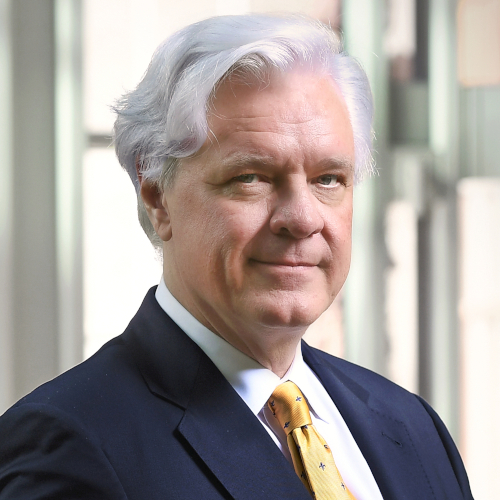Cultivating team resilience through a relentless crisis
- September 1, 2021
- By Mark Taylor
- 4 minute read

Then will he strip his sleeve and show his scars.
—Henry V, Act IV, scene iii
And say ‘These wounds I had on Crispin’s day.’
Old men forget: yet all shall be forgot,
But he’ll remember with advantages
What feats he did that day …
Thanks to a global crisis that’s now overlapped three academic years, WashU Olin’s staff, faculty and students could be forgiven if they were simply exhausted. Since March 2020, “pivot” has become a four-letter word, and I am keenly aware that in these 18 months, I have asked much of the Olin team.
I have asked, and each time our team has answered with commitment, agility, innovation and resilience. This experience has me reflecting on how that happens. How do managers, leaders and teams continue pushing forward in the face of relentless demands?
Over these months, I’ve often thought of King Henry’s inspirational words to his men on the eve of the Battle of Agincourt. We’re in this together, he says. Years from now, we’ll recall with pride what we accomplished together.
I realize this may be a bit corny, but it’s no less true. I do remind our team that we’re in this together. I try to tie each of us, on a personal level, to the reason we’re here: not for a job, but to achieve the high standards our students expect—and we expect of ourselves. I remind colleagues that through our work, we maintain the financial stability of the school, and thus affect so many stakeholders—students, alumni, staff, faculty and beyond.
The power of team resilience
So, how does it happen? How do leaders continue to drive teams forward when the circumstances never let up? My colleague Andrew Knight, professor of organizational behavior, is well-versed in the related research under the umbrella of “team resilience.”
One category of this research studies how teams function when their work by nature is persistently stressful—trauma surgery teams, SWAT teams, firefighters and the like.
“The second category comprises teams that work under typically stable situations, but that face sudden serious crises that threaten their viability,” Andrew said. “These teams are typically engaged in more prosaic kinds of work, but something renders their old work processes and routines ineffective.”
Sound familiar?
In summarizing the research, Andrew highlights work from a 2015 paper published in ScienceDirect summarizing the five markers of resilient teams.
- They respond in the moment to problems.
- They preserve a positive team climate.
- They stock up on resources, including the tangible (equipment) and the intangible (relationships).
- They quickly recover from errors, learning from rather than ruminating on mistakes.
- They remain highly viable when challenges subside, allowing them to face new challenges.
Tied to our experience
Andrew related the work of a 2020 research paper in the journal BMJ Leader to our experience. “This paper underscores the importance of action and learning in the face of prolonged crisis,” Andrew notes, calling out three steps successful leaders (and resilient teams) employ under these circumstances.
- Create productive disruptions: Create time to connect and reflect among team members. “This aligns well with the use of town halls at Olin throughout COVID,” Andrew noted.
- Reconfigure, redeploy and repurpose resources: View resources in a flexible way and use them to meet new challenges. In this case, Andrew referenced “the CDE as a resource to enable virtual and hybrid modalities.”
- Attend to emotions: Check in with one another. Build connections. I think of the way we embraced collaboration tools such as Teams and Hive, frequent virtual meetings—and my opportunities to pop in and greet my colleagues.
Taking stock of our work
As I said earlier, I’ve asked a great deal of everyone—but I haven’t asked in a vacuum. Our senior leadership meets daily and decisions, by and large, are made by consensus. And it’s important to take stock of what we’ve accomplished.
- We created and re-created plans for the MBA global immersion.
- We adapted curriculum to hybrid instruction and upgraded classroom technology.
- We conceived, planned and promoted a full slate of online-only SMP and MBA programs.
- We built a summer experiential program last year to replace canceled internships.
- We staged a robust springtime China residency program—in two locations—for SMP students.
- We created virtual networking events to connect students with alumni and corporate recruiters.
- We drew crowds to a rich series of virtual speakers and panel discussions.
- We reworked policies and procedures to accommodate our virtual workplace.
- We reconfigured building space, maintenance schedules and usage—again, multiple times.
These are only a few examples. And, indeed, they’re only examples of work the pandemic imposed. Through it all, our team continued meeting goals set in our strategic plan such as triple accreditation and the full rollout of our Salesforce client management system.
Which leads to the final, most important strategy for leading teams through crisis: We must remember to say thank you and look ahead toward the day when we’ll strip our sleeves, show our scars and recall what we accomplished together.
Media inquiries
For assistance with media inquiries and to find faculty experts, please contact Washington University Marketing & Communications.
Monday–Friday, 8:30 to 5 p.m.
Sara Savat
Senior News Director, Business and Social Sciences
